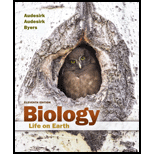
Concept explainers
Which of the following statements about protists is False?
a. Some protists are photosynthetic.
b. All protists are eukaryotes.
c. Although protists are diverse, they form a single clade.
d. Protists include both unicellular and multicellular species.
Introduction:
Bacteria, archaea, and eukaryotes are the three domains of life. The eukaryotes consist of plant, animals, and fungi. However, there are certain eukaryotes that do not fall in these three groups. They are collectively known as protists.
Answer to Problem 1MC
Correct answer:
The false statement from the given statements is that although the protists are diverse, they form a single clade.
Explanation of Solution
Explanation for the correct answer:
Option (c) is given that, although protists are diverse, they form a single clade is false about protists. A clade can be defined as a group consists of all the decedents of a particular common ancestor. The protists do not have a common ancestor. All the protists are not even related. Protist is a term coined by systematics to help them catalog the organisms that do not fall in specific eukaryotes types. Thus, the protists do not form a single clade. Hence, option (c) is a correct answer.
Explanation for the incorrect answers:
Option (a) is given that some protists are photosynthetic is false about protists. However, protists gain nutrition by different processes like nutrient absorption from the surroundings, ingestion of food, and capturing solar energy through the process of photosynthesis. The example of photosynthetic protist is Caulerpa. So, it is an incorrect option.
Option (b) is given that all protists are eukaryotes, is false about protists. Of the life’s three domains, only bacteria and archaea are prokaryotes. All protists are eukaryotes; however, they do not fall in plant, animal, or fungi categories. So, it is an incorrect option.
Option (d) is given that protists include both unicellular and multicellular species is false about protists. Most of the protists are unicellular and so, they are usually invisible; however, there are some multicellular protists that are physiologically and structurally complex. So, it is an incorrect option.
Hence, options (a), (b), and (d) are incorrect.
Therefore, it can be concluded that although the protists are diverse, they do not form a single clade. This is because they do not have a single ancestor.
Want to see more full solutions like this?
Chapter 21 Solutions
Biology: Life on Earth (11th Edition)
- Protists with the capabilities to absorb nutrients from dead organisms are called ______. a. photoautotrophs b. autotrophs c. saprobes d. heterotrophsarrow_forwardWhy is the classification of protists based on DNA sequences considered useful? a. Because only protists have DNA b. Because genetic sequences have confirmed the traditional categories of protists c. Because DNA reveals evolutionary relationships, even among organisms that look different d. All of the above are correct.arrow_forwardWhich of the following characteristics is NOT one all protists share? A. mixotrophic, autotrophic and heterotrophic B. eukaryotic C. mostly unicellular D. symbiontsarrow_forward
- Why is the classification of protists based on DNA sequences useful? * a. Because only protists have DNA b. Because it has confirmed the traditional categories for protists c. Because it has revealed evolutionary relationships, even among organisms that look diffferent d. All of the above are correct This is a required question (2) Why is a species with small population more likely than one with a large population to undergo an extinction? * a. Because small population are exposed to greater environmental changes b. Because genetic diversity is likely to be lower in a small population c. Because the mutation rate is too low d. Because they take too long to produce an offspring.arrow_forwardWhich of these protists is believed to have evolved following a secondary endosymbiosis? a. green algae b. cyanobacteria c. red algae d. chlorarachniophytesarrow_forwardA principle of biology is that biology affects our society. Whyare the cysts of protists important to epidemiologists, thebiologists who study the spread of disease?arrow_forward
- What genus of protists appears to contradict the statement that unicellularity restricts cell size? a. Dictyostelium b. Ulva c. Plasmodium d. Caulerpaarrow_forwardProtists with the capabilities to perform photosynthesis and to absorb nutrients from dead organisms are called ______________. a. photoautotrophs b. mixotrophs c. saprobes d. heterotrophsarrow_forwardCertain protists species cause human disease that are difficult to treat and are often deadly. How does the evolutionary relatedness of humans and protists explain the difficultly of treating a person infected with a pathogenic protist?arrow_forward
- Which statement about protists is true? a. Protists have many different metabolic lifestyles. b. Almost all protists are parasitic. c. All protists use pseudopods or cilia to locomote. d. All marine protists rid themselves of excess water by means of contractile vacuoles. e. Protists are found only in aquatic habitats.arrow_forwardWhich of the following processes are involved in thereproduction of protists ?(a) Binary fission and budding(b) Cell fusion and zygote formation(c) Spore formation and cyst formation(d) All of the above Please try to break the solutions into as many steps as practically possible and the steps should come one by one and they should be short and crisp and plagiarism-free.arrow_forwardProtists are a group of eukaryotic organisms that are brought together by scientists mostly by convenience. I) What is the relationship between all protists that ties them together? ii) provide an example of a autotrophic and heterotrophic protists group, iii) what is the relationship between the multicellular eukaryotes and the protists?arrow_forward

 Concepts of BiologyBiologyISBN:9781938168116Author:Samantha Fowler, Rebecca Roush, James WisePublisher:OpenStax College
Concepts of BiologyBiologyISBN:9781938168116Author:Samantha Fowler, Rebecca Roush, James WisePublisher:OpenStax College Biology (MindTap Course List)BiologyISBN:9781337392938Author:Eldra Solomon, Charles Martin, Diana W. Martin, Linda R. BergPublisher:Cengage Learning
Biology (MindTap Course List)BiologyISBN:9781337392938Author:Eldra Solomon, Charles Martin, Diana W. Martin, Linda R. BergPublisher:Cengage Learning


